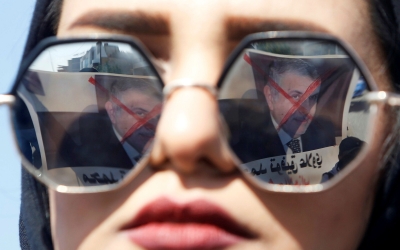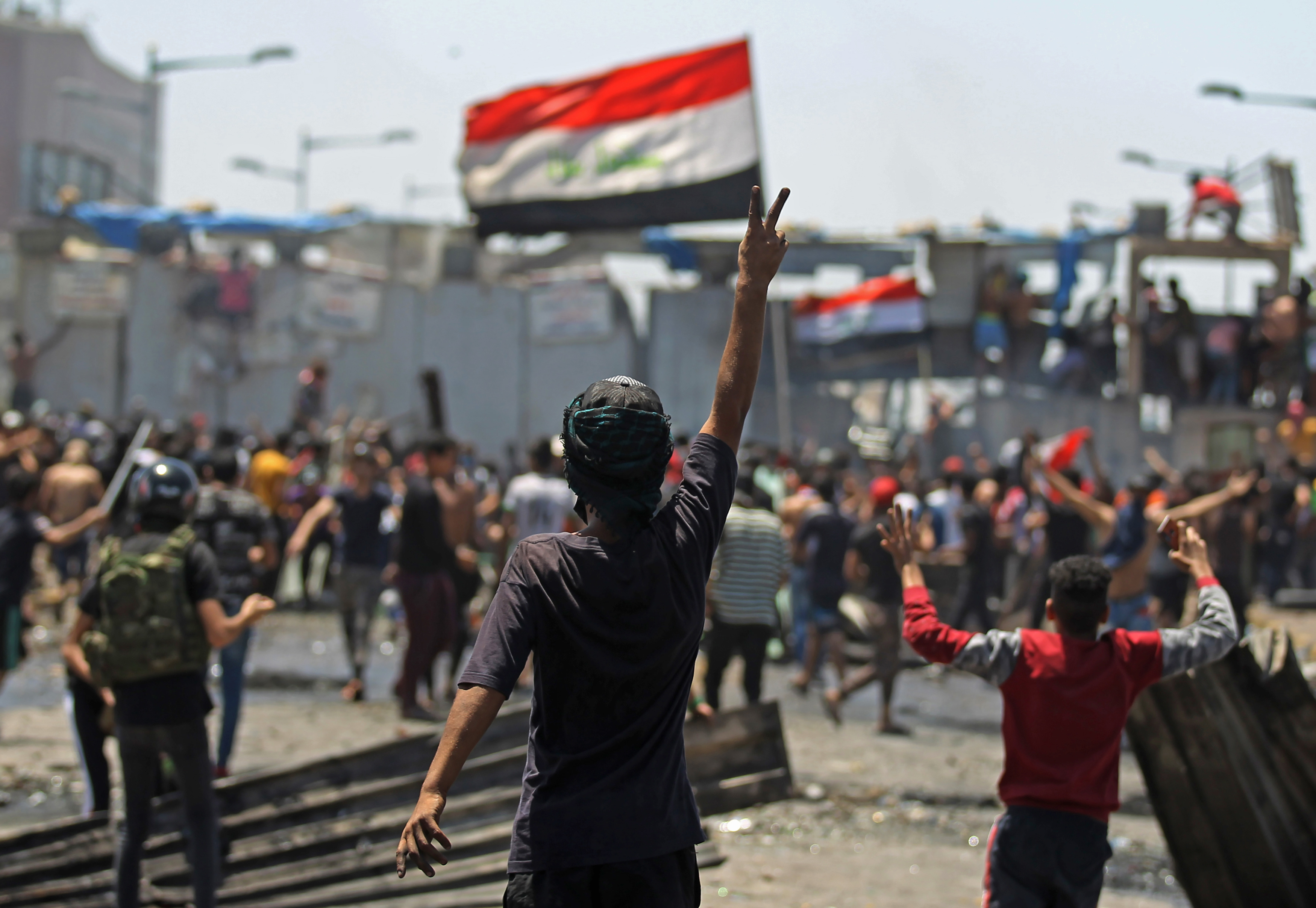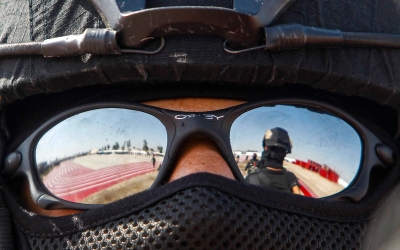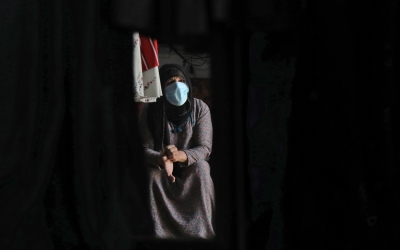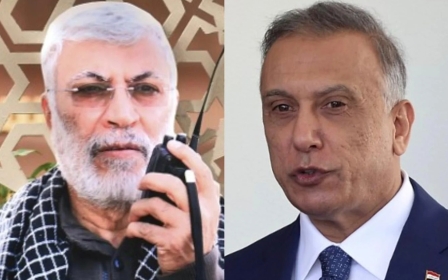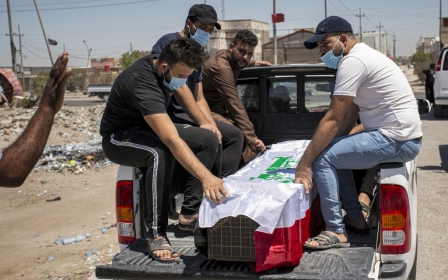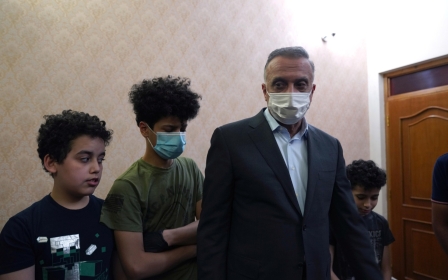'Man of settlements': Iraq's Kadhimi walks the line in anti-corruption drive

It was 15 September when Ahmed, the office manager of an Iraqi political leader, was surprised by his phone ringing at an unusually early hour. His boss asked him to check the accuracy of the news about the arrest of Ahmed al-Saadi, the director of the National Pension Authority, in central Baghdad, hours earlier.
"He [his boss] was surprised and incredulous. He asked me to find out if the news he received about Saadi's arrest and a number of bank directors was true,” Ahmed, using only his first name, told Middle East Eye.
“The news of the arrests circulated frantically that day and many names were mentioned. He knows that some of the mentioned names are untouchable, but he wanted to be sure.”
Less than 48 hours later, the news of the arrest of Shaker al-Zamili, the head of the Baghdad Investment Commission, and Bahaa Abdul-Hussein, the head of the electronic payment company Qi-Card, a joint venture between the private sector and the state, was confirmed.
Ahmed was surprised by his phone ringing again. His boss was speaking nervously and anxiously this time, asking him to arrange a meeting with a number of his bloc members and allies to discuss the latest developments.
New MEE newsletter: Jerusalem Dispatch
Sign up to get the latest insights and analysis on Israel-Palestine, alongside Turkey Unpacked and other MEE newsletters
'Most of the corrupt officials, including former and current ministers and general managers, live in great anxiety and fear, and this is what is required'
- Hisham al-Suhail, head of the Iraqi parliamentary bloc
Iraq, Opec’s second largest oil producer and one of the most resources-rich nations in the region, has been ranked high on the list of the most corrupt countries since 2003.
Most of the political forces and armed factions involved in the political process illegally use the financial and human resources of the state to finance their activities. Some officials estimate that Iraq's losses amounted to $450bn over the past 17 years due to financial and administrative corruption.
Although there are many anti-corruption institutions - including the Integrity Commission, the Office of Financial Supervision, the Supreme Council for Combating Corruption, the Parliamentary Integrity Committee and the Supreme Judicial Council - they have all failed to curb the spread of corruption in all government institutions and ministries.
Some of these institutions provided the necessary legal cover to protect corrupt senior government officials
Most of the cases that convict senior officials on charges of corruption are put away in drawers, suspending arrest warrants, as they enjoy some form of political immunity provided by the political leaders and armed factions that benefit from the services provided to them through corruption.
“There is great concern and apprehension about the recent anti-corruption measures,” Hisham al-Suhail, head of the Iraqi parliamentary bloc and a member of the Parliamentary Integrity Committee, told MEE.
“Most of the corrupt officials, including former and current ministers and general managers, live in great anxiety and fear, and this is what is required.
“Politicians cannot access public money without the cooperation of government employees, therefore the person charged with a public service must actually feel that there are rewards and punishment and that there are consequences for the illegal services they have been providing to the politicians."
Exceptional crimes
On 27 August, Iraqi Prime Minister Mustafa al-Kadhimi issued a decree to form a special committee "to investigate cases of corruption and exceptional crimes".
The committee, which is to directly report to the prime minister, consists of three members representing the National Intelligence and Security Service and the Integrity Commission, in addition to 25 investigators from the three institutions.
The committee has the power to request any information it needs from all ministry or governmental institutions and to summon any person, regardless of their job title or rank, if the investigations require it, according to a copy of the ministerial decree seen by MEE.
The surprise that "angered and worried" most of the leaders of the political forces and armed factions was that Kadhimi has assigned Lieutenant General Ahmed Taha Abu Ragheef, a senior officer in the Ministry of the Interior known for "his boldness and lack of fear of political forces and armed factions”, to chair this committee.
Tasked with implementing the decisions issued by the "Abu Ragheef Committee", as Iraqi politicians have started calling it, was the Counter-Terrorism Squad (CTS), the most prominent elite force in Iraq.
"All institutions working to combat corruption have failed in their mission over the past years because the decisions issued by them are either leaked - allowing the corrupt officials to escape, procrastinate and bargain - or suspended for fear of the reactions of the forces associated with the corrupt," a former member of the Supreme Council for Combating Corruption told MEE on condition of anonymity.
"Therefore, we needed a security or military force that was not penetrated and that everyone feared, to implement the orders of the judges working on corruption cases.
"The proposal to use a battalion from the CTS was presented to former Prime Minister Adel Abdul-Mahdi last year, but it was not implemented due to nationwide anti-government demonstrations and the political repercussions that followed."
The committee, which adopted near-total secrecy in its work, did not disclose the dossiers it is currently working on, but the targeted names and those close to them revealed part of the ongoing investigations.
The first appears to be targeting officials in the banking sector, including directors of government banks, in Baghdad and the provinces.
So far, Adel Khader, the director of the Iraqi Agricultural Bank, his son, and 10 other employees have been arrested, in addition to the managers of the bank's branches in Fallujah, Ramadi, Abu Ghraib and Salahuddin, banking and security sources told MEE.
Travel bans issued
Meanwhile, directors of private banks, some of whom have family ties to political leaders and former senior central bank officials, are also being investigated, banking sources said.
Additionally, the committee is investigating cases related to the Baghdad municipality and the Ministry of Electricity. The first case is looking into work by the municipality and financial breaches involving hundreds of millions of dollars, in which former Baghdad mayor Dhikra Alloush and her office director are accused of being implicated.
The second case centres around financial and administrative violations involving former electricity minister Louay al-Khateeb.
Travel bans have been issued against Alloush, Khateeb and dozens of officials associated with the three cases, officials familiar with the investigations told MEE.
The most prominent arrests, which seem to "have caused a lot of concern", are those of Saadi, Zamili and Abdul-Hussein.
'We do not need to target any politician or armed faction at this stage. We are satisfied, at this stage, to trim their nails and dry up their sources of funding'
- Shia political leader
Saadi, whose services were terminated as head of the National Pension Authority at the end of June, is currently under investigation on charges related to seizure of salaries of thousands of deceased retirees who were not removed from monthly payrolls, in addition to the salaries of tens of thousands of fictitious retirees.
Saadi is also being investigated for committing fraud in cooperation with the Qi Card Company "to monthly obtain illegally deducted payments from the salaries of millions of retirees", a senior federal official familiar with the investigations told MEE.
"The cases of Saadi and Abdul-Hussein are linked. Saadi was the one who dragged Abdul-Hussein to the investigation,” the official said.
"Abdel-Hussein is not a government official. He is a businessman, but he participated in major corruption operations with Saadi. Saadi admitted that he was his partner in thefts amounting to hundreds of millions of dollars per month.
"All from retirees' money and from the budget allocated to finance the retirement fund."
Meanwhile, the probe into Zamili, who has held his position since 2016, is related to ongoing investigations of corruption involving state real estate, water and sewage projects, and investment licences for fake projects, members of the Parliamentary Integrity Committee told MEE.
The three men were arrested in Baghdad, and the number of those involved with them in these case has not yet been announced.
"The best thing is for them [the detainees] to confess before they even get to the investigation headquarters," a Shia political leader close to Kadhimi and familiar with the committee's work, told MEE condition of anonymity.
"Each of them would drag five heads or more with him, and this is what we need now to sustain the momentum of the committee's work.
"We do not need to target any politician or armed faction at this stage. We are satisfied, at this stage, to trim their nails and dry up their sources of funding.
"If we manage to continue at this pace, we will achieve a lot in a record time."
Walking the line
On 14 September, Kadhimi announced a series of new appointments for special posts.
Governor of the Central Bank was the most prominent and important of these positions, and was assigned to Mustafa Ghaleb, who had headed the bank's legal department for many years.
Kadhimi claimed that Ghaleb is an independent, but all political blocs said he is backed by influential Shia leader Muqtada al-Sadr, hence “the post went to the Sadrists”.
"This was an appeasement reward for Sadr and an attempt to neutralise him in the upcoming days. Let's say it was a bribe. A big one,” a senior Sadrist politician told MEE.
"Since 2007, we have been seeking to obtain some key government seats. During Abdul-Mahdi's era we just got the position of secretary general of the Council of Ministers, but Kadhimi was generous and we were given the Central Bank and one of the agencies of the Ministry of Interior.”
Another prominent seat was the Integrity Commission, and Judge Alaa Jawad, who was running the post for years as acting head, was tasked with presiding over it. While Kadhimi said that Jawad is also an independent, he is backed, however, by former Prime Minister Nouri al-Maliki.
'This was an appeasement reward for Sadr and an attempt to neutralise him in the upcoming days. Let's say it was a bribe. A big one'
- Senior Sadrist politician
"Everyone knows that assigning Jawad to the position of presidency of the Integrity Commission was aimed at reassuring and satisfying Maliki,” the head of one political bloc told MEE, requesting not to be named.
In return, Kadhimi took advantage of the "compromises he granted" to regain control of three of the most important government positions that have a great impact on the banking and investment sectors.
He assigned Salem Chalabi, a corporate and investment-banking lawyer and one of his close associates, to head the state-owned Trade Bank of Iraq (TBI).
Faisal al-Haimas, the former chairman of the TBI, was assigned to head the Securities Commission. Kadhimi also assigned his adviser Suha al-Najjar, a Christian and expert in venture capital and attracting investment companies, to chair the National Investment Authority.
Strengthening control
Kadhimi also strengthened his control over the National Security Agency by appointing Faleh Yunus al-Issawi, a Sunni lawmaker backed by Parliament Speaker Mohamed al-Halbousi, as deputy chief of the agency.
Meanwhile, he appointed Khalid al-Ubaidi, a former defence minister who is backed by former prime minister Haider al-Abadi, as deputy head of the intelligence service for national operations.
"Kadhimi was not successful in his choices to fill the positions that were announced recently. He has appointed politicised figures, linked to political forces, or accused in corruption cases,” Fadi al-Shimari, head of the Hikma party and one of Kadhimi’s allies, told MEE.
“The names clearly indicate the association of those appointed to the forces of [the Iranian backed parliamentary bloc of] Fatah, Saieroon [Sadr], the State of Law [Maliki] and the Alliance of Forces [Halbousi].
“Nothing differed from the power-sharing pattern that his predecessors followed. The only difference is that the new appointments have added personalities related to Kadhimi himself."
Shimari said that the most dangerous appointment was the candidate who has filled the position of governor of the Central Bank, as he lacked specialisation and skill in the finance and economic sectors.
“It is clear that there was a suspicious deal [between Sadrists and Kadhimi] that was made far from the spotlight and bypassed Kadhimi's allies and backers,” Shimari said.
Three members of Kadhimi's team who spoke to the Middle East Eye did not deny that the recent appointments "were not perfect" and that most of them "did not fall outside the political quota system".
"Mustafa [Kadhimi] works within the limits of what is possible without turning the tables on others [his political partners and opponents],” a key adviser to the prime minister said on condition of anonymity.
“He does not want to give them any impression that he is not sticking to the rules of the game, but he gradually began to have a share in the appointments like them [leaders of political forces].
“Three months ago, he was begging to appoint someone close to him in any position, now he is the one who imposes people he wants to occupy some seats.
“Mustafa is stronger now, more confident in himself and learning how to use his tools to achieve greater impact. The deal looks profitable so far.”
Avoid the heart, attack the extremities
Political leaders and MPs who spoke to MEE have downplayed the campaign led by Kadhimi to combat corruption because it has yet to target major corrupt figures.
"The steps that Kadhimi took to hit some junior employees do not mean eliminating corruption, but rather a step that draws attention for his attempt to work on this issue,” Kadhim al-Shimari, head of the National Bloc and member of the Parliamentary Integrity Committee, told MEE.
'Kadhimi is still revolving around the small nonpartisan employees, and he is not even close to a hornets' nest. If he continues with this approach, he will not achieve anything'
- Kadhim al-Shimari, head of the National Bloc
"Kadhimi is still revolving around the small nonpartisan employees, and he is not even close to a hornets' nest. If he continues with this approach, he will not achieve anything.”
Kadhimi, who is known as the "man of settlements", has chosen to avoid provoking his opponents or giving them an excuse to block his way to leave an imprint on the corruption file, members of his team told MEE.
The policy that the prime minister has so far pursued, according to his team, is based on two principles: the first is to not delve into "issues or corruption cases that have a political dimension"; and the second to "avoid whales and focus on corrupt officials who are not directly related to political forces or armed factions".
"The goal is to confuse senior corrupt [figures], distract their focus and limit their control. This can be achieved by striking the corrupt officials without clashing with their sponsors,” a key adviser to Kadhimi told MEE.
“Corruption in Iraq is based on the bureaucratic overlap between politics and money, where the politician provides the interface required to protect the corrupt, while they open the way to public money.
“Hitting the arms [corrupt officials] will eventually lead to restrictions on the main body, which is represented by corrupt forces, whether they are individuals or groups.
“We do not have many options according to the current surrounding conditions. The option to target the extremities seems the best so far. Let’s hope that this will keep up without serious security consequences.”
Middle East Eye delivers independent and unrivalled coverage and analysis of the Middle East, North Africa and beyond. To learn more about republishing this content and the associated fees, please fill out this form. More about MEE can be found here.


